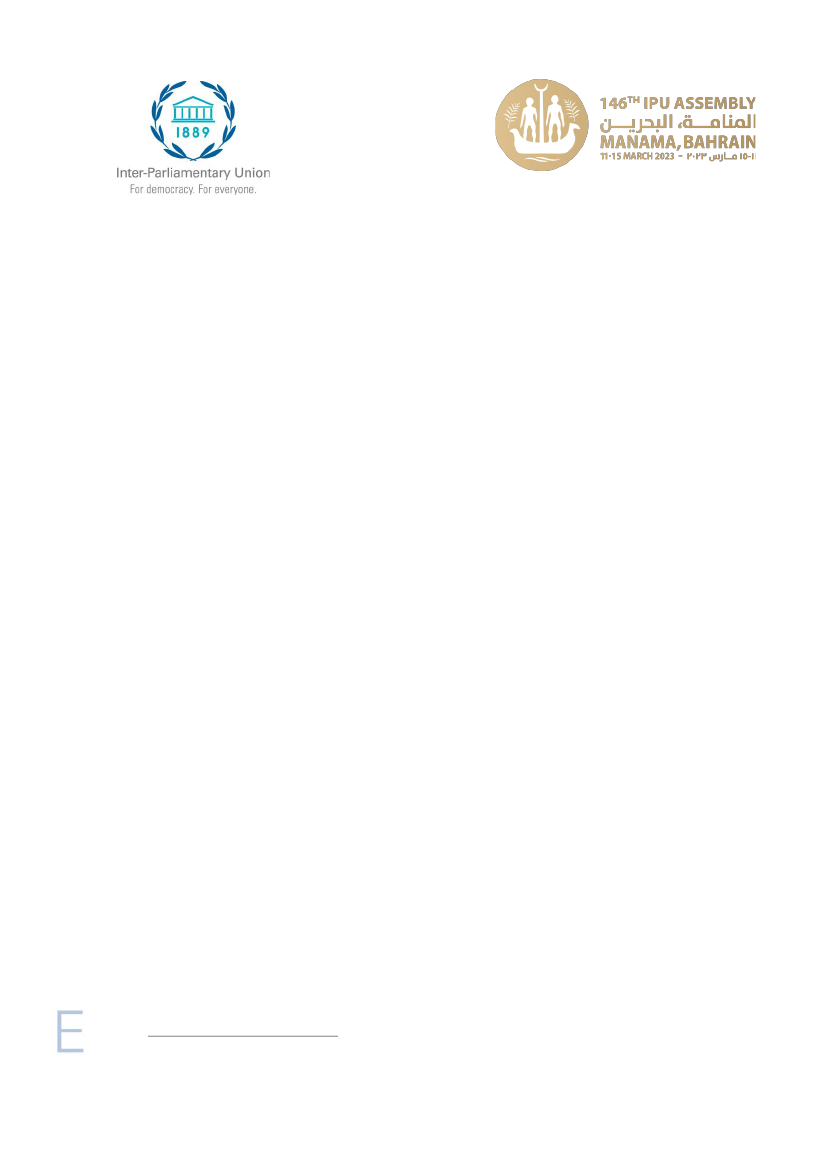
146th IPU Assembly
Manama (11–15 March 2023)
Raising awareness and calling for action on the serious humanitarian
crises affecting the peoples of Afghanistan, the Syrian Arab Republic,
Ukraine, Yemen and other countries, and on the particular
vulnerability of women and children
Resolution adopted by consensus
*
by the 146th IPU Assembly
(Manama, 14 March 2023)
The 146th Assembly of the Inter-Parliamentary Union,
Considering
that low- and middle-income countries host 74% of the world’s refugees and
other people in need of international protection, that the least developed countries provide asylum to
22% of these people, and that 90% of the world’s humanitarian needs are concentrated in 20 countries
that, together, represent no more than 13% of the world’s population and 1.6% of global GDP,
Cognizant
that the affected countries cannot meet the needs of the at-risk population,
making it essential for the international community to guarantee humanitarian assistance including food
distribution, health care and, in many cases, infrastructure reconstruction, and that, in 2023,
an estimated 340 million people will need humanitarian assistance,
Recalling
that such international humanitarian assistance is protected by the “right to life,
liberty and security” of all persons, an inalienable and universal principle enshrined in Article 3 of the
Universal Declaration of Human Rights
of 1948, and that these rights have been endorsed in the
International Covenant on Economic Social and Cultural Rights
and the
International Covenant on Civil
and Political Rights
of 1966, the
Convention on the Prevention and Punishment of the Crime of Genocide
of 1948, and the Geneva Conventions of 1949 and their Additional Protocols, among others, which
together constitute the international legal framework that, pursuant to Article 2 of the
Universal
Declaration of Human Rights,
promotes and protects the human rights of all “without distinction of any
kind, such as race, colour, sex, language, religion, political or other opinion, national or social origin,
property, birth or other status”,
Underlining
that the United Nations General Assembly has made achieving gender equality
by 2030 a target of the Sustainable Development Goals (SDGs), in particular through Goal 5, including
but not limited to Target 5.2: “Eliminate all forms of violence against all women and girls in public and
private spheres, including trafficking and sexual and other types of exploitation”,
Recalling
United Nations General Assembly resolution 2816 of 14 December 1971, which
established the post of Disaster Relief Co-ordinator (DRC) to provide humanitarian assistance to victims
of natural disasters and other emergencies, and resolution 46/182 of 19 December 1991, through which
the DRC was renamed the United Nations Office for the Coordination of Humanitarian Affairs (OCHA)
and given expanded powers to coordinate humanitarian assistance, to facilitate access to emergency
areas, to conduct the organization’s needs assessment missions, to prepare joint appeals and to
mobilize resources,
*
The delegation of Yemen expressed a reservation on the entire resolution.
The delegation of India abstained from supporting the resolution.
#IPU146